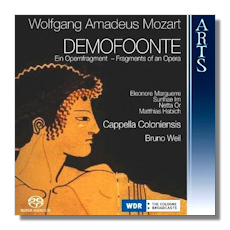
The Internet's Premier Classical Music Source
Related Links
- Mozart Reviews
- Latest Reviews
- More Reviews
-
By Composer
-
Collections
DVD & Blu-ray
Books
Concert Reviews
Articles/Interviews
Software
Audio
Search Amazon
Recommended Links
Site News
 SACD Review
SACD Review
Wolfgang Mozart

Demofoonte
Fragments of an Opera
- Matthias Habich: Demofonte
- Eleonore Marguerre: Timote
- Sunhae Inn: Dircea
- Metta Or: Creusa
Cappella Colinensis/Bruno Weil
Arts 47746-8 2SACDs 94m Hybrid Multichannel SACD
"Demofonte" was one of Mestasio's most famous libretti out of the 27 that were written by the Imperial Court poet, so it is no surprise that Mozart was attracted to the story so much, that while he was in Paris in 1778 he was seriously contemplating on writing a full-scale opera, but for some unknown reason, the project never got off the ground.
So what do we have here? Although the title indicates that these are fragments of an opera, in all truth there are no fragments at all, but rather a succession of six concert arias for soprano and orchestra that Mozart composed between 1770 and 1782 following the key moments of the plot. To supplement the gaps in the story, German author Sabine Radermacher decided to write spoken text passages according to the order in Metastasio's libretto to beef up the work and give it a semblance of unity.
Finally the missing parts in the narrative are filled by music from the Cassation K. 299 and "Les petit riens" K. 299b. The result of all this tinkering is a plausible musical document which should give fresh insight on one of Mozart's "might have beens". The Cappella Coloniensis displays both flamboyancy and sweetly poetic sounds according to the dictates of the composer and the three sopranos are all impressively secure in music that is full of mighty leaps and challenging moments. Although a below-par booklet might raise some eyebrows, the consistently superb music-making and impeccable sound quality should make this set the subject of serious investigation.
Copyright © 2008, Gerald Fenech




















